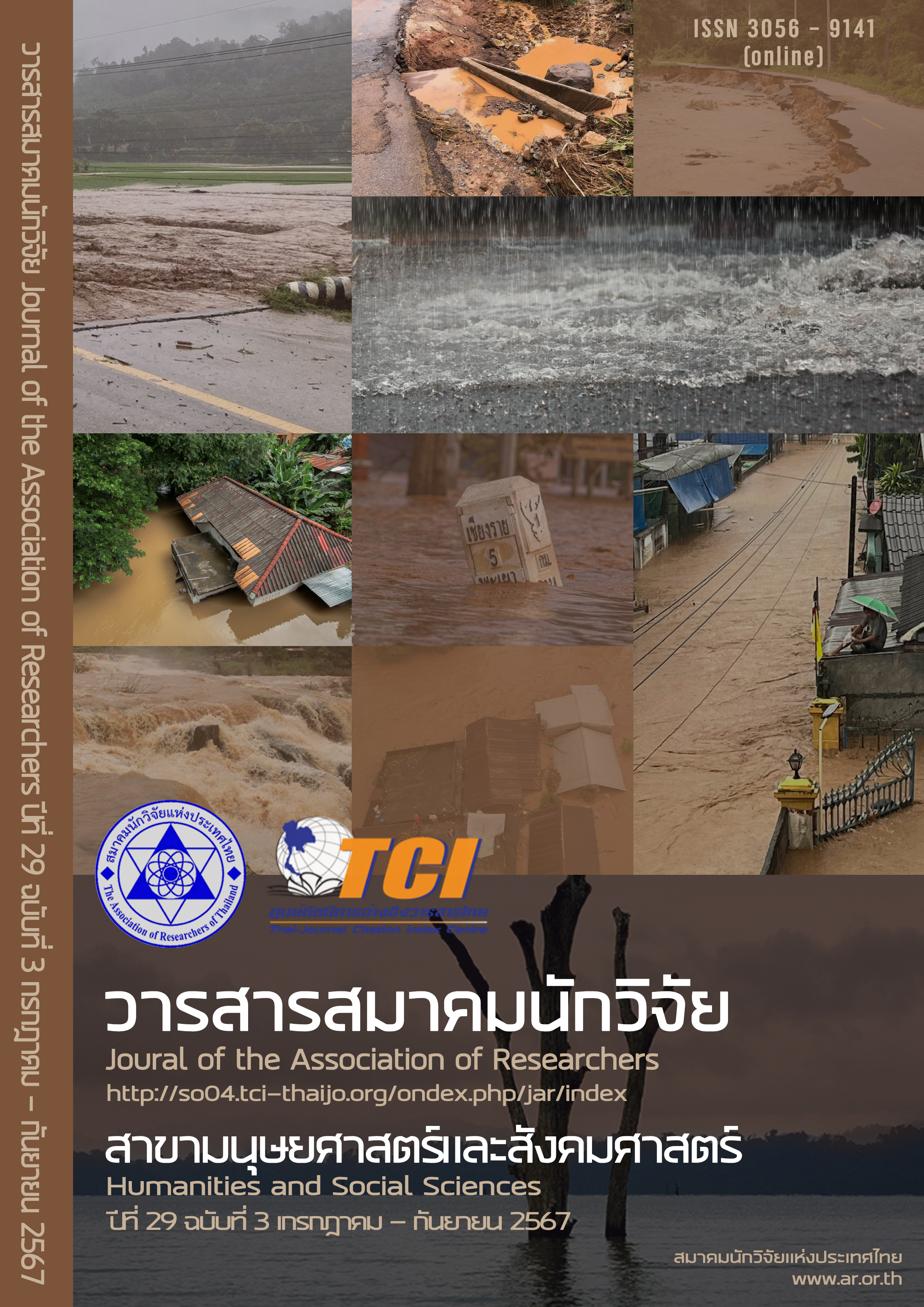Approaches to Developing Trainer Competencies According to the Security Guard Business Act. B.E. 2558
Main Article Content
Abstract
This research article aimed to investigate and develop the competencies of training under the Security Guard Business Act B.E. 2558. The study`s sample group consisted of 225 individuals, including trainers and training institution administrators, selected through purposive sampling. Additionally, 17 individuals involved in security personnel training were interviewed. The research findings identified seven competency development approaches for trainers in the security training curriculum according to the Security Guard Business Act B.E. 2558. 1) The knowledge approach involved the aggregation of knowledge, creation of new knowledge, organization of knowledge, and knowledge sharing. 2) The skills approach encompassed technology, interpersonal relations, intellectual skill, problem-solving, and adaptation. 3) The ability approach focused on integration, self-development, and achievement effectiveness in teaching. 4) The personal characteristic approach pertained to ethics and professional conduct. 5) The self-development approach related to health, personality, knowledge, and knowledge dissemination. 6) The leadership approach involved vision, self-confidence, interpersonal relationships, maturity, and qualifications. 7) The teamwork approach included having common goal, organizational commitment, performance evaluation, and motivation building in working. Recommendations for developing skills used in security should provide training in important skills that cover the departments that will be performing their duties, such as traffic work, use of various technological media, basic first aid principles, and training in practical skills for reception/basic questioning.
Article Details

This work is licensed under a Creative Commons Attribution-NonCommercial-NoDerivatives 4.0 International License.
บทความที่ปรากฏในวารสารนี้ เป็นความรับผิดชอบของผู้เขียน ซึ่งสมาคมนักวิจัยไม่จำเป็นต้องเห็นด้วยเสมอไป การนำเสนอผลงานวิจัยและบทความในวารสารนี้ไปเผยแพร่สามารถกระทำได้ โดยระบุแหล่งอ้างอิงจาก "วารสารสมาคมนักวิจัย"
References
กรวิทย์ ทองโชค. (2542). การศึกษาคุณลักษณะที่พึงประสงค์ของวิทยากรภายในตามทัศนะของผู้เข้ารับการอบรมหลักสูตร "สินเชื่อ" ธนาคารศรีนคร จำกัด (มหาชน). (วิทยานิพนธ์ศึกษาศาสตรมหาบัณฑิต). กรุงเทพมหานคร : มหาวิทยาลัยรามคำแหง).
เกษศิรินทร์ กิตติพงษ์ภากรณ์. (2553). ความคิดเห็นของผู้บริหารและสมาชิกฟิตเนสเซ็นเตอร์เกี่ยวกับ คุณลักษณะที่พึงประสงค์ของผู้นำการออกกำลังกาย. [วิทยานิพนธ์ปริญญามหาบัณฑิต ไม่ได้ ตีพิมพ์]. จุฬาลงกรณ์มหาวิทยาลัย.
ชัยวัฒน์ ทิพย์ลมัย. (2543). ปัจจัยที่มีผลต่อพฤติกรรมความปลอดภัยในการทำงานของเจ้าหน้าที่ความปลอดภัยในการทำงานระดับวิชาชีพในโรงงานอุตสาหกรรม เขตจังหวัดฉะเชิงเทรา. (วิทยานิพนธ์ปริญญาศิลปศาสตรมหาบัณฑิต (รัฐศาสตร์) บัณฑิตวิทยาลัย มหาวิทยาลัยเกษตรศาสตร์, กรุงเทพมหานคร.
ชานนท์ เศรษฐแสงศรี. (2555). ระบบการพัฒนาสมรรถนะของผู้ประกอบวิชาชีพครูโยใช้ โรงเรียนเป็นฐานในโรงเรียนสังกัดองค์กรปกครองส่วนท้องถิ่น. ในดุษฎีนิพนธ์ การศึกษาดุษฎีบัณฑิต สาขาวิชาการบริหารและพัฒนาการศึกษา. มหาสารคาม มหาสารคาม.
ชูชัย สมิทธิไกร. (2550). การสรรหา การคัดเลือก และการประเมินผลการปฏิบัติงานของบุคลากร. (พิมพ์ครั้งที่2). กรุงเทพฯ: สํานักพิมพ์แห่งจุฬาลงกรณ์มหาวิทยาลัย.
ธัญลักษณ์ หงษ์โต และ พิทักษ์ ศิริวงศ์. (2560). เรื่องเล่าบนเส้นทางสังเวียนตัวตนคนชี้ขาด : กรณีศึกษากรรมการผู้ตัดสินกีฬามวยไทยอาชีพ.วารสารสุขศึกษา พลศึกษา และสันทนาการ, 43(2).113-124.
พิมลพรรณ เพชรสมบัติ. (2564). ความสัมพันธ์ระหว่างทักษะผู้บริหารสถานศึกษากับสมรรถนะหลักของครูสังกัดสำนักงานเขตพื้นที่การศึกษาประถมศึกษานครนายก, วารสารวิจยวิชาการ, 5(2).65-75.
พระพนมภรณ์ ฐานิสสโร และคณะ. (2563). การจัดการความรู้: กระบวนการพัฒนาคนและการพัฒนางาน.Journal of Roi Kaensarn Academi ปีที่ 5 ฉบับที่ 2 ประจำเดือนกรกฎาคม – ธันวาคม 2563.
เพชรา พิพัฒน์สันติกุล และคณะ. (2564). การพัฒนารูปแบบการฝึกอบรมเพื่อพัฒนาศักยภาพงานช่าง-วิศวกรรมที่มีความร่วมมือระหว่างสถานประกอบการกับสถาบันอุดมศึกษา. วารสารมหาวิทยาลัยราชภัฏธนบุรี 15(2).
ณรงค์วิทย์ แสนทอง. (2547). มาร้จัก ู Competency กันเถอะ. กรุงเทพมหานคร: เอชอาร์เซ็นเตอร์.
โรงเรียนรักษาความปลอดภัยสายทอง. (2562). อบรมหลักสูตรการรักษาความปลอดภัยตามพระราชบัญญัติธุรกิจรักษาความปลอดภัย พ.ศ.2558 รุ่น 12/2562. จังหวัดนครราชสีมา.
วิโรจน์สารรัตนะ. (2557). ภาวะผู้นำ: ทฤษฎีและนานาทัศนะร่วมสมัยปัจจุบัน. กรุงเทพฯ: ทิพยวิสุทธ.
สุกัญญา รัศมีธรรมโชติ.(2549). แนวทางการพัฒนาศักยภาพมนุษย์ด้วย Competency Based Learning. กรุงเทพฯ: ศิริวัฒนาอินเตอร์พริ้นท์จํากัด (มหาชน).
Amos S. Engelbrecht and Gardielle Heine. (2015). The influence of integrity and ethicalleadership on trust in the leader. Management Dynamics : Journal of the Southern African Institute for Management Scientists 24(1) · January 2015.
Carver,C., & Scheie,M. (2004). Perspectives on personality. (5th ed.) Boston: Pearson.
Macmillan, Thomas T. (1971). “The Delphi Technique.”, Paper Presented at the annual meeting of the California Junior Colleges Associations Committee on Research and Development, Monterey, California. (May 1971), 3-5.
Sharma P. (2017). Competence Development at the Workplace: a conceptual framework. JK International Journal of Management and Social Science. 1(1): 39-44.
Translate in Thai Reference
Advance Security Training Center (2019) (in Thai).
Hongto T. & Siriwong. P. (2017). Stories on the path of the ring of the identity of the referee: A case study of professional Thai boxing referees. Journal of Health Education, Physical Education and Recreation, 43(2).113-124 (in Thai).
Kittipongphakorn. K. (2010). Opinions of fitness center executives and members on Desirable characteristics of exercise leaders. [Unpublished master's thesis]. Chulalongkorn University. (in Thai).
Phra Phanomphon Thanissaro et al. (2020). Knowledge Management: Human Development Process and Work Development. Journal of Roi Kaensarn Academy,5, (2), (in Thai).
Phetsombat P. (2021). The relationship between the skills of school administrators and the core competencies of teachers under the Office of the Nakhon Nayok Primary Educational Service Area, Academic Research Journal, 5(2).65-75 (in Thai).
Pipatsantikun P. et al. (2021). Development of a training model to develop the potential of technicians and engineers with cooperation between business establishments and higher education institutions. Journal of Thonburi Rajabhat University 15(2). (in Thai).
Sai Thong Security School. (2019). Security training course according to the Security Business Act 2015, Class 12/2019. Nakhon Ratchasima Province. (in Thai).
Saranat. W. (2014). Leadership: Contemporary Theories and Perspectives. Bangkok: Thipphawisut. (in Thai).
Smitthikrai. C. (2007). Recruitment, selection and performance evaluation of personnel. (in Thai).
Saenthong. N. (2004). Let's get to know Competency. Bangkok: HR Center. (in Thai).
Setthasangsri. C. (2012). The system for developing the competence of teachers using schools as a base in schools under local administrative organizations. In the thesis of the Doctor of Education in the field of Educational Administration and Development. Mahasarakham, Mahasarakham. (in Thai).
Thipphammai. C. (2000). Factors affecting work safety behavior of professional work safety officers in industrial plants in Chachoengsao Province. (Master of Arts Thesis (Political Science), Graduate School, Kasetsart University, Bangkok. (in Thai).
Thongchok. K. (1999). A study of the desirable characteristics of internal trainers according to the views of participants in the "Loan" training course at Sri Nakhon Bank Public Company Limited. (Master of Education Thesis). Bangkok: Ramkhamhaeng University). (in Thai).
Rasmithamchote. S. (2006). Guidelines for developing human potential with Competency Based Learning. Bangkok: Siriwattana Interprint Public Company Limited. (in Thai).


